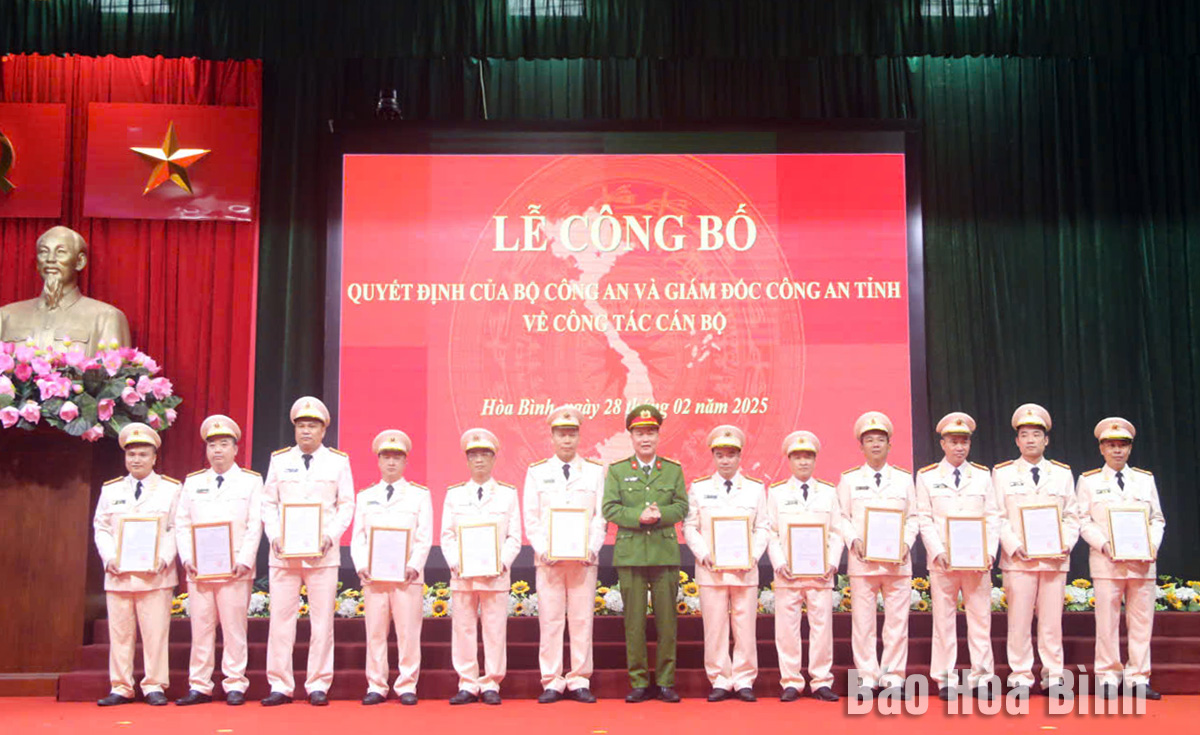
The provincial Department of Public Security has reorganised its structure to enhance operational efficiency and meet the evolving demands of the new era. In line with the Resolution No. 25 of the Central Public Security Party Committee, the move aims to streamline personnel, standardise leadership roles, and strengthen the police force’s capacity while creating better conditions for modernising equipment.

A leader of the provincial Department of
Public Security presents appointment decisions to commune police chiefs.
To facilitate this restructuring, 26 officers
voluntarily retired before the statutory age as of March 1. They include eight
bureau heads, three district police chiefs, 11 deputy bureau heads, three
deputy district police chiefs, and the head of the provincial police’s women
affairs board.
Colonel Tran Manh Hai, head of the PC02 Department
with 41 years of service, was among those who stepped down. Expressing honour
to contribute to the restructuring effort, Hai said he will continue supporting
public security by actively participating in the activities of the People’s
Public Security Veterans Association.
The restructuring aligns with the broader vision of
building a more efficient two-tiered provincial and grassroots police force,
where provincial police handle comprehensive security issues while strengthened
communal police tackle local concerns.
This approach aims to enhance administrative reforms
and bring public security services closer to the people.
The restructuring involves the redeployment of 996
officers into leadership and operational positions. The new structure
prioritises strengthening frontline units tasked with direct public security
duties and those assigned additional responsibilities.
Colonel Do Thanh Binh, Director of the provincial
Department of Public Security, affirmed that since March 1, the new
organisational framework has been fully put in place without any disruption to
operations.
With a spirit of dedication to the nation and
people, the public security force will continue working efficiently and
professionally to safeguard public security and maintain social order, Binh
said.
In recent years, the education and training sector in Cao Phong district, Hoa Binh province, has actively integrated its tasks with the promotion of studying and following President Ho Chi Minh’s thought, ethics, and style. This approach has contributed significantly to improving the overall quality of education across the district.
The Hoa Binh provincial museum on May 16 opened a thematic exhibition "Under the flag of the glorious Communist Party of Vietnam" with more than 200 documents, images and objects featuring the glorious 95-year journey of the Party.
Hoa Binh police are collecting public feedback on amendments to the 2013 Constitution via the national identification app VNeID. This innovative approach marks a giant leap towards modernising grassroots democracy and enhancing transparency in public consultation.
Nguyen Phi Long, alternate Member of the Party Central Committee and Secretary of the Hoa Binh Party Committee, on May 14 chaired a meeting of the provincial steering committee for its programme to eliminate makeshift and dilapidated housing for the poor. The session reviewed the programme’s outcomes to date and discussed forthcoming tasks.
The Steering Committee for Sci-tech Development, Innovation, Digital Transformation, and Project 06 of Hoa Binh province held a conference on May 12 to review the 2024 results of the Public Administration Reform (PAR) Index, Citizen Satisfaction Index, and Provincial Governance and Public Administration Performance Index (PAPI). The meeting was chaired by Bui Duc Hinh, Deputy Secretary of the provincial Party Committee and Chairman of the provincial People’s Committee.
Hoa Binh city was filled with a democratic atmosphere as local authorities conducted a survey of public opinions regarding the proposal to restructure provincial and communal administrative units during late April. The survey is considered a significant step, reflecting the administration's commitment to valuing the voices of the people on a major initiative that profoundly impacts the future development of the locality.



